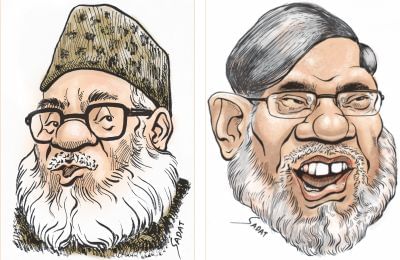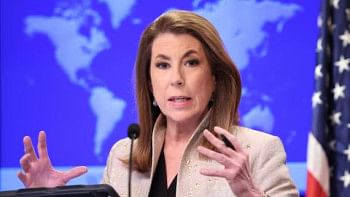Nizami, Mojaheed tortured Rumi, Altaf

Jamaat leaders Nizami and Mojaheed tortured martyred freedom fighter Rumi and musician Altaf Mahmud at a camp of the Pakistani army in Nakhalpara of Dhaka, said a witness before the International Crimes Tribunal-2 yesterday.
Rumi and Altaf never came home as Nizami and Mojaheed decided to have them killed, said second prosecution witness and freedom fighter Zahir Uddin Jalal in the war crimes case against Mojaheed.
Jalal was also in the camp and was brutally tortured by Jamaat Ameer Motiur Rahman Nizami and Jamaat Secretary General Ali Ahsan Mohammad Mojaheed, the witness said.
Mojaheed and Nizami also tortured Jalal's fellow fighters at the camp apart from Altaf and Rumi, son of Shaheed Janani Jahanara Imam, during the Liberation War.
Jalal was lucky to have escaped death as a Pakistan government official rescued him, the witness said.
Jalal had heard Mojaheed and Nizami ask a Pakistani captain to have Rumi, Altaf and himself killed.
“We assumed that Mojaheed, Nizami and their cohorts had killed them before the proclamation of the President's clemency as we did not get any information about them afterwards,” said Jalal.
Jalal, also known as Bichchhu Jalal, yesterday appeared before the Tribunal-2, 41 years after the war, and narrated his horrific ordeal at the camp.
Mojaheed, who was in the dock, listened to the vivid description from the “direct victim” and an eyewitness yesterday. Mojaheed is facing seven charges of crimes against humanity, including murder, genocide and hatching a conspiracy to kill intellectuals during the nine-month-long war.
The 57-year-old witness said he had hurled a grenade at an Al-Badr rally at Chawkbazar, aiming it at Mojaheed on December 4, 1971, and the news of the rally was published with photos in newspapers.
During his four hours and 20 minutes of testimony, Jalal said Nizami, Mojaheed and other Al-Badr men used to torture intellectuals and freedom fighters before killing them at Mohammadpur Physical Training College during the war.
Jalal, son of a police official, was a class IX student then. He used to live at New Circuit House in the capital's Eskaton Garden, said Jalal, adding that top police and government officials also lived there.
When Lt Gen Tikka Khan was appointed governor of East Pakistan, leaders and activists of Islami Chhatra Sangha, the then student wing of the Jamaat-e-Islami, and Muslim League began to collude with the Pakistani army, said Jalal.
He said they used to torture people and made lists of Hindus and Awami Leaguers.
He said after March 26, 1971, there was a temporary army camp in front of the New Circuit House. One day in April some people went to their building and left after some time.
“Pointing at two of them, my father told me that one is Motiur Rahman Nizami of Pabna and another is Ali Ahsan Mohammad Mojaheed. As per the intelligence reports, they were infamous as they were rowdy,” said the witness, quoting his father.
Jalal said he left Dhaka on April 12 to take part in the war and after having training in India in June, he along with co-freedom fighters returned to Dhaka for battle.
On August 30, 1971, Dhaka Company Commander Abdul Aziz assigned Jalal to attack the home of Dolly Asad, a member in the national assembly during Ayub Khan's tenure. Pakistan army personnel were supposed to hold a meeting with collaborators there, said the witness.
Razakars picked up Jalal when he went near the home on a reconnaissance mission before the actual attack.
They handed him over to the Pakistani army who took him to a building near Tejgaon MP Hostel, said the witness, adding that afterwards he came to know that the building was at West Nakhalpara.
On that day around 7:00pm, eight to 10 people were brought to the room he was confined in, said the witness.
“I was astonished to see they were my co-fighters with whom I had training at Matinagar camp,” said Jalal, adding, “I saw Badi, Jewel, Azad and Rumi Bhai among them and there was Altaf Mahmud, composer of the Ekushey February song.”
Jalal gave vivid descriptions of the torture on his co-fighters and Altaf Mahmud. Most of their fingers had been cut off.
When Jalal talked to Jewel, he told him how they were tortured and asked him not to disclose anything about freedom fighters, said the witness.
“Around 8:00pm, Motiur Rahman Nizami and Mojaheed along with three or four others went to the room of Capt Kayum, walking past my confinement room,” said the witness, adding, “Indicating Nizami and Mojaheed, Jewel said they along with others had tortured them.”
“He [Jewel] also said Mojaheed and Nizami might kill them any time,” said Jalal.
After some time Capt Kayum ordered his soldiers to bring Jalal before him. They tried to glean information out of him, said Jalal.
“Nizami brought out a 'Five Star Pistol' from his waist and reprimanded him and demanded to know what Jalal had told the others inside the room and how he knew them,” said the witness.
“Asking such questions, he [Nizami] started to hit my two wrists with the pistol and blood came out of my wrists.”
“When I did not say anything, he [Nizami] threatened to bring my mother and sister from my house.
“At that time Mojaheed, who was standing there, called Mainuddin and when he came in, Mojaheed took the Sten gun from him and hit the back of my head with it, using abusive language all the time.
“Blood squirted out of my head instantly,” said the witness, adding, “He kicked me to the floor and continued beating me up.”
Jalal said they then took him to the room where his co-fighters were confined and indicating them Mojaheed told Jalal that they would torture him to a state like them if he did not disclose information.
“Then Mojaheed went to Capt Kayum's room and Nizami and Mojaheed both said this Picchi [which means small as Jalal was a small person] and traitors Badi, Rumi, Jewel, Altab should be shot dead before the president proclaims clemency on September 5 and their bodies be made to disappear,” said the witness.
He said, “I heard this while I was all bloodied on the floor.”
Afterwards two Pakistani army men took him to the MP Hostel, which was an army camp then.
Pakistani government official CM Afzal, also Jalal's neighbour, rescued him from there.
Two days after his rescue, he again went to India and shared news of his and his fellow fighters' ordeals.
More fighters had to come to Dhaka for a revenge operation and attempts to rescue the ones still detained, said Jalal, adding that they failed to find the captured freedom fighters.
Jalal said on December 4, 1971, he saw Mojaheed addressing a rally from a sports utility vehicle, hoisting a banner of Al-Badr, at the city's Chawkbazar.
He was using abusive language against freedoms fighters.
Jalal quoting Mojaheed said, “These traitors, Hindustanis [words he used to describe freedom fighters] are to be hunted down and killed. Those who fight against the Pakistani army and the Al-Badr will be killed.
“Al-Badr has already killed many traitors [freedom fighters] and gained the praise of Pakistani [authorities] and we the Al-Badr will save Pakistan sacrificing our blood.
“None, including intellectuals, doctors, journalists, will be spared if they support Joy Bangla [victory to Bangla], freedom fighters,” Jalal quoted Mojaheed.
At one point three fighter planes flew over the rally and Mojaheed took shelter next to a building. Jalal then hurled the grenade at Mojaheed, said the witness.
He said they also had Mohammadpur Physical Training College as a listed target but could not make the attack due to its fortification.
The college was the headquarters of the Al-Badr force where “Al-Badr Commanders Nizami and Mojaheed” in association with the Pakistani army used to train Al-Badr men.
He said one Rustam of the college used to provide them with information about Al-Badr members, their torture of intellectuals and freedom fighters, their killings and dumping of bodies at Rayerbazar.
He said on December 17 he visited the college and found nine skulls and bloodstains there.
The tribunal, headed by Justice ATM Fazle Kabir with member Judge M Shahinur Islam, recorded his testimony before adjourning the case proceedings until September 25 when Jalal will face cross-examination.

 For all latest news, follow The Daily Star's Google News channel.
For all latest news, follow The Daily Star's Google News channel. 



Comments